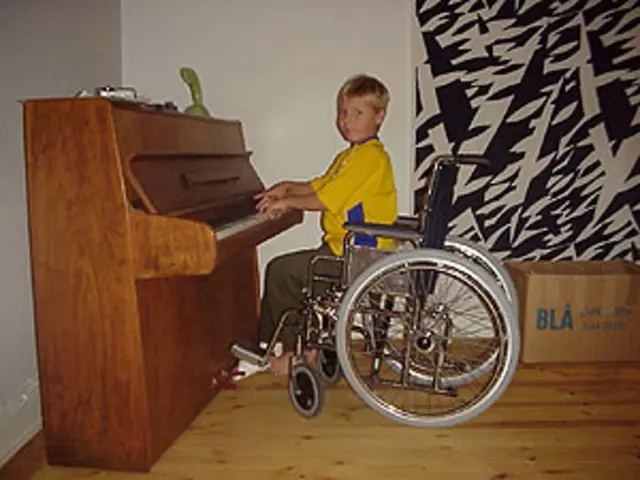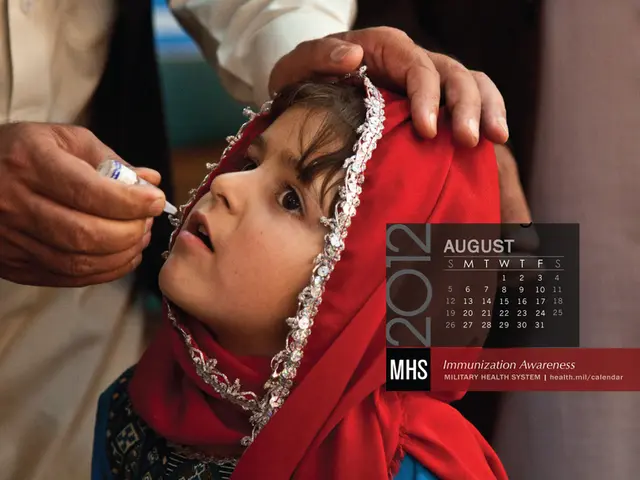Can Genetics Play a Role in Colon Cancer Development?
Is your colon cancer a family affair?
Shedding light on some truths, Cleveland Clinic, a non-profit academic medical center, shares insights on whether your colorectal cancer is hereditary. Just like your distinctive freckles, curly hair, or green eyes, you can inherit colorectal cancer from your family.
Here's the deal: If someone in your family tree has this type of cancer, particularly a parent or sibling, it bumps up your odds of getting it too. However, only about 5% of colorectal cancers are inherited as part of a syndrome.
So, how do you spot the warning signs? If someone younger than 50 in your family gets colorectal cancer, that's your first clue. If your family has a history of colon cancer, your own lifetime risk increases from about 5% to 15%. Having more than one first-degree relative with the disease significantly raises your risk even more.
Now, what genetic conditions put you at a higher risk for colon cancer? Approximately 10 inherited disorders can cause colorectal cancer, including Lynch syndrome, Familial adenomatous polyposis, Juvenile polyposis syndrome, Peutz-Jeghers syndrome, Cowden syndrome, and MUTYH-associated polyposis.
Are you thinking about genetic testing? Thanks to technological advancements, genetic panel testing is now much more affordable and readily available. With one test, all known genes that might cause inherited colorectal cancer can be sequenced. If a mutation is found, all of your at-risk relatives should have genetic testing.
Let's talk about Lynch Syndrome, a common culprit behind hereditary colorectal cancer. It's caused by mutations in the MLH1, MSH2, MSH6, PMS2, or EPCAM genes, responsible for DNA mismatch repair. Lynch Syndrome increases the risk of colon cancer, often diagnosed at a younger age, typically between 40-60, and elevates the risk of other cancers like endometrial, ovarian, gastric, brain, and kidney cancers.
If you test positive for an inherited colorectal cancer syndrome, seek a gastrointestinal specialist experienced in treating inherited colorectal cancers. It's not the same as treating regular colorectal cancers, clarifies Dr. Liska.
So what should you do if someone in your immediate family had or has colorectal cancer? If a genetic mutation is found via blood or saliva testing, get yourself checked too. Talking to a genetic counselor and educating yourself on the disease, its risks, and appropriate steps are essential. Remember that even if one family member has inherited colorectal cancer, it doesn't automatically mean you will.
Bottom line? Genetic testing is the simplest way of knowing your chances of inheriting the disease, but you should also get a colon screening. Screenings, combined with a healthy lifestyle, can help reduce your risk of colorectal cancer. Limiting red meat, exercising regularly, quitting smoking, and talking to your doctor about early screenings are all steps in the right direction.
- While your family history may not directly cause colorectal cancer, it can increase your risk, similar to inherited traits like freckles or curly hair.
- If a parent or sibling has colorectal cancer, it could potentially increase your odds of getting it by about 5% to 15%.
- There are about 10 inherited disorders that can put you at a higher risk for colon cancer, such as Lynch Syndrome, Familial adenomatous polyposis, and MUTYH-associated polyposis.
- Genetic panel testing, made more affordable by technology, can sequence all known genes that might cause inherited colorectal cancer.
- Lynch Syndrome, a common cause of hereditary colorectal cancer, increases the risk of colon cancer, often diagnosed at a younger age, and elevates the risk of other cancers like endometrial, ovarian, gastric, brain, and kidney cancers.
- If you test positive for an inherited colorectal cancer syndrome, seek a gastrointestinal specialist experienced in treating inherited colorectal cancers, as treatment differs from regular colorectal cancers.
- If a genetic mutation is found via blood or saliva testing, it's crucial to get yourself checked and educate yourself about the disease, its risks, and appropriate steps to reduce your risk.
- Along with genetic testing and colon screenings, maintaining a healthy lifestyle, such as limiting red meat, exercising regularly, quitting smoking, and talking to your doctor about early screenings, can help reduce your risk of colorectal cancer.








